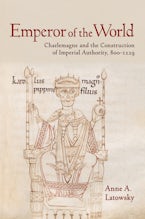Charlemagne holds a cardinal place in the collective imagination of medieval politics. The character has been reinterpereted throughout the centuries depending on the different causes his figure has been used to support.... Consequently, certain hypotheses are transformed too quickly into facts. Anne Latowsky questions the validity of one of the most ingrained certainties: that the figure of Charlemagne was used to promote the idea of crusade and feed the fervor of crusaders.... We can only hope that she will complete this provoking work by returning to the vernacular sources of her initial project.
~Annales
In her superb new book... Latowsky contributes to a broader literature that has recently begun to reexamine and rethink the remembrance of Charlemagne and the Carolingians in the West.... Over the course of her study, Latowsky deftly reveals the ways that this apocalyptic discourse [surrounding the fabled Last Emperor, prophesied by the ancient sibylline tradition to reunite East and West and herald the end of time itself] was merged with the foreign embassy motif, and how this striking hybrid enabled the expression, ranging from praise to polemic, of ideas about rulership and the nature of the political.
~American Historical Review
Latowsky untangles the complicated processes of projection and reception whereby legend was transformed into ideology to become a significant and contested theme in cultural history. The results are original and illuminating. They also raise timely questions about methodology and interdisciplinarity which will be of interest to all medievalists whatever their affiliations in university departments.
~H-France Review
Latowsky's detailed analyses of the refashioning of Charlemagne’s figure and the construction of his fictive journey to the East shows convincingly how ideological needs and changes in political contexts lead to an adaptation of a powerful narrative over the course of four centuries. Her careful untangling of the sources as well as the readjusting of the historiographically accepted image of Charlemagne as a crusader 'avant la lettre’ shows how profitably her book fits into the contemporary scholarly questioning of historical narratives as cultural and political constructs in light of global history, for the image of Charlemagne continues to be adapted even today.
~The Journal of Medieval Latin 24
Latowsky's efforts to enrich our understanding of what the motif of Charlemagne in the East meant to medieval writers, and to insist on the relevance of the empire to this story, are successful and constitute an important addition to the field. One of the particular virtues of her work is her ability to combine close readings of literary texts with sensitive appreciation of the historical contexts that produced them, without reducing the literary texts to a simple reflection of political policies.... She has.... provided a nuanced new perspective on a very old legend, one that encourages her readers to appreciate the multivalent responses that the figure of Charlemagne evoked in the medieval German empire.
~German Studies Review
